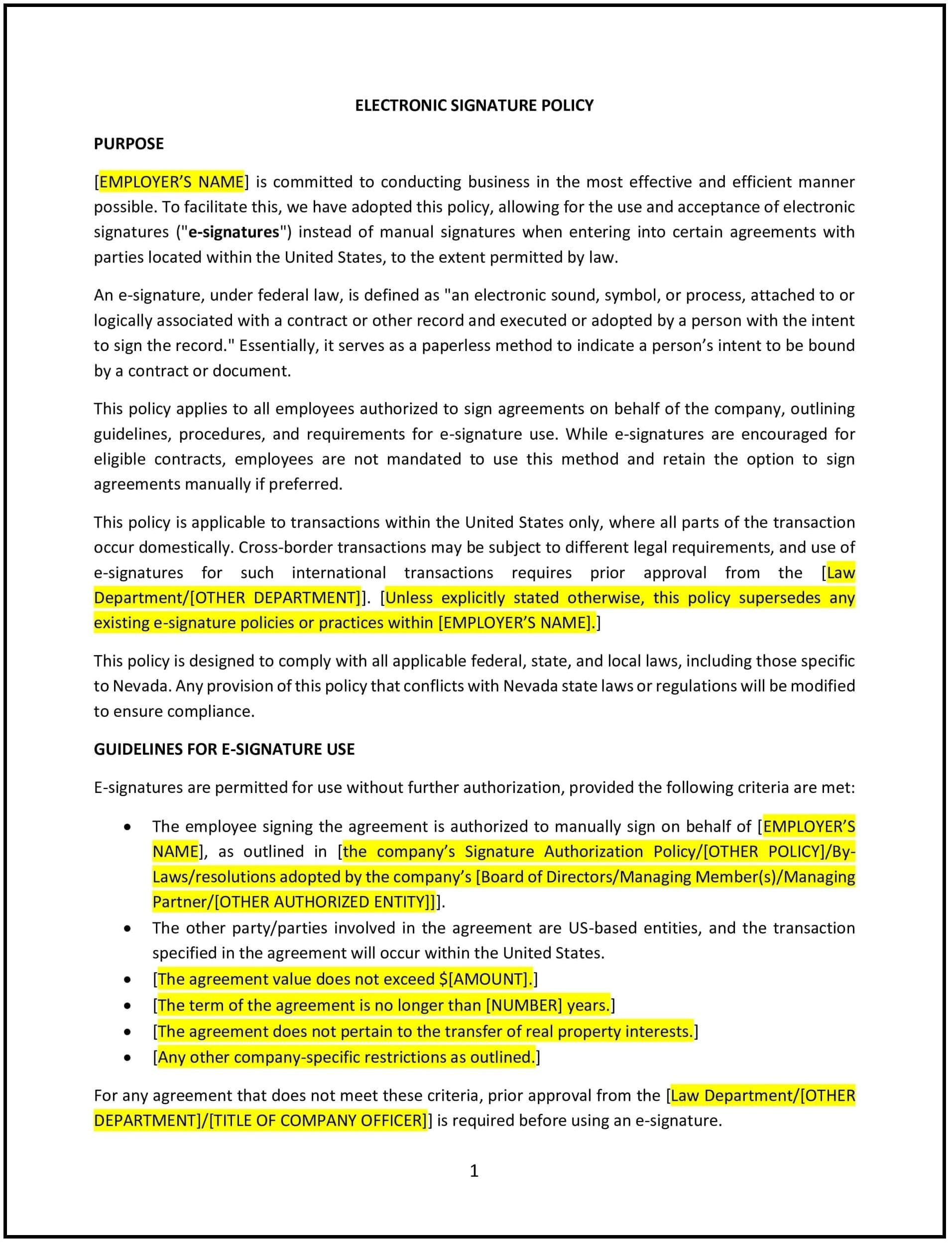Electronic signature policy (Nevada): Free template
Got contracts to review? While you're here for policies, let Cobrief make contract review effortless—start your free review now.

Customize this template for free
Electronic signature policy (Nevada)
This electronic signature policy is designed to help Nevada businesses establish guidelines for using electronic signatures to execute documents and contracts. It outlines the company’s approach to electronic signature use, ensuring that electronic signatures are legally valid, secure, and compliant with applicable state and federal regulations.
By adopting this policy, businesses can streamline document signing processes, improve efficiency, and ensure the integrity of electronic transactions.
How to use this electronic signature policy (Nevada)
- Define electronic signature: Clearly define what constitutes an electronic signature, including digital signatures, typed names, and scanned signatures. The policy should specify that an electronic signature is any mark or process that indicates consent or approval of a document or agreement.
- Set guidelines for use: Specify when electronic signatures are allowed to be used, such as for internal company documents, client contracts, or vendor agreements. Ensure that only authorized personnel can approve the use of electronic signatures for specific types of documents.
- Ensure legal compliance: Ensure that all electronic signatures are compliant with Nevada state laws and federal regulations, such as the Electronic Signatures in Global and National Commerce Act (ESIGN Act) and the Uniform Electronic Transactions Act (UETA).
- Address security measures: Outline the security measures in place to protect the integrity and confidentiality of documents signed electronically, including encryption and authentication protocols.
- Specify acceptable electronic signature platforms: Define the platforms or technologies that are approved for use, such as DocuSign, Adobe Sign, or other secure electronic signature solutions. Ensure that these platforms comply with industry standards for security and legal validity.
- Maintain record-keeping standards: Establish guidelines for maintaining and storing electronically signed documents, ensuring they are securely stored and retrievable for future reference. Specify the retention period for these documents based on legal or business needs.
- Set procedures for invalid or rejected signatures: Define the procedures for handling cases where an electronic signature is invalid or rejected, such as the need for a physical signature or additional verification steps.
- Ensure accessibility: Ensure that electronic signature solutions are accessible to employees, clients, and vendors, and provide accommodations for individuals who may need assistance in signing documents electronically.
Benefits of using this electronic signature policy (Nevada)
This policy provides several key benefits for Nevada businesses:
- Increases efficiency: Electronic signatures streamline document signing processes, reducing the need for paper-based workflows and enabling faster execution of agreements.
- Reduces costs: By eliminating the need for physical signatures, paper, and mailing, businesses can reduce administrative costs and resources associated with traditional document signing.
- Enhances security: Electronic signature platforms often include encryption and authentication features, providing a higher level of security than traditional paper signatures.
- Promotes legal compliance: This policy ensures that electronic signatures are legally valid, complying with applicable state and federal laws, such as the ESIGN Act and UETA.
- Supports remote work: Electronic signatures enable businesses to execute documents remotely, improving flexibility and enabling employees and clients to sign documents from anywhere.
Tips for using this electronic signature policy (Nevada)
- Communicate the policy clearly: Ensure that all employees are aware of the policy and understand when and how electronic signatures should be used. This information can be provided in onboarding materials or employee handbooks.
- Choose a secure platform: Select an electronic signature platform that offers robust security measures, such as encryption and authentication, to protect the integrity of signed documents.
- Regularly review the policy: Periodically review the policy to ensure it remains aligned with changes in Nevada state laws, federal regulations, and evolving business needs.
- Provide training: Offer training for employees on how to use electronic signature platforms, ensuring they understand the legal implications and security protocols involved in electronically signing documents.
- Track and store signed documents: Implement a system for tracking and securely storing electronically signed documents to ensure compliance with record retention policies and regulations.